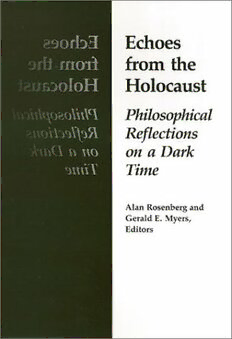
Echoes from the Holocaust: philosophical reflections on a dark time PDF
472 Pages·1988·18.805 MB·English
Most books are stored in the elastic cloud where traffic is expensive. For this reason, we have a limit on daily download.
Preview Echoes from the Holocaust: philosophical reflections on a dark time
Description:
The murder of six million Jewish men, women, and children during World War II was an act of such barbarity as to constitute one of the central events of our time; yet a list of the major concerns of professional philosophers since 1945 would exclude the Holocaust. This collection of twenty-three essays, most of which were written expressly for this volume, is the first book to focus comprehensively on the profound issues and philosophical significance of the Holocaust. The essays, written for general as well as professional readers, convey an extraordinary range of factual information and philosophical reflection in seeking to identify the haunting meanings of the Holocaust. Among the questions addressed are: How should philosophy approach the Holocaust? What part did the philosophical climate play in allowing Hitlerism its temporary triumph? What is the philosophical climate today and what are its probable cultural effects? Can philosophy help our culture to become a bulwark against future agents of evil? The multiple dimensions of the Holocaust historical, sociological, psychological, religious, moral, and literary are collected here for concentrated philosophical interpretations. Alan Rosenberg is a Lecturer in the Philosophy Department at Queens College of the City University of New York. Gerald E. Myers is Professor of Philosophy at Queens College and CUNY Graduate Center.
See more
The list of books you might like
Most books are stored in the elastic cloud where traffic is expensive. For this reason, we have a limit on daily download.
